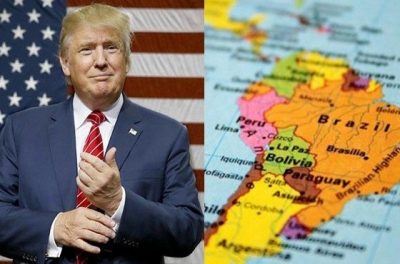Will Policy of Destabilizing Latin American Countries Help Trump to be Re-Elected?

As the 2020 U.S. Presidential Election campaign heats up, there is every chance that Donald Trump can become a one-term president as the popularity of Bernie Sanders increases despite the sabotage within his own Democrat Party against him. There still remains a strong possibility that Sanders can become the next president sitting in the White House. Sanders continues to grow mass appeal, with former Trump White House Chief Strategist Steve Bannon even conceding last month that the Democrat candidate is a “populist,” even if it is different to that of Trump’s. Sanders appeals to the impoverished by directing the frustrations of Middle America to the ultrarich who are fighting tooth and nail to bring the U.S. to Western standards by providing free education and healthcare. This is in contrasts to Trump’s populism which redirects anger of Middle America’s increasing impoverishment to the so-called immigrant “invasion” coming from Latin America.
One of Trump’s main platforms for his seemingly ‘unlikely’ election win, as many so-called experts thought of it back in 2016, was to build a wall traversing the border between the U.S. and Mexico to make it even more difficult for illegal immigrants to enter the North American country. All the slurs and accusations of racism were not able to subdue Trump’s fever as many in Middle America believed they finally found a candidate that spoke their language, addressed their issues and provided a solution to the so-called problem of illegal immigrants “invading” their country. Trump of course knows that illegal immigrants are not the reason for the U.S. problems of de-industrialization, lack of job opportunities, unaffordability and poverty – but it was this rhetoric that projected him into what was an unexpected win for the presidency against Hillary Clinton.
With Sanders speaking of a new populism, not based on a so-called invasion from immigrants, but actually addressing the real issues of the U.S. political and economic system, it is likely that Trump will resort back to the fear of Latin American illegal immigrants to project him to the presidency. This of course may not be necessary in the likely case that the Democrats ignore the popularity of Sanders to go for a Hillary Clinton-like hack and establishment pawn like Joe Biden who will prove unpopular against Trump. None-the-less, Trump will not take chances and will begin using the refugee card, frightening U.S. voters with the threat of new flows coming from Venezuela, Bolivia, Honduras, Mexico and other countries.
Meanwhile the world’s focus right now is on the Greek-Turkish border where tens of thousands of illegal immigrants are trying to enter Greece on the orders of Turkish President Recep Tayyip Erdoğan, with a high level of international solidarity going to the European country. However, there are stark differences between the migration crisis between the U.S. and Greece. Greece is an impoverished post-colonial country that was under Turkish occupation for over 400 years and does not have the means to support such large numbers.
Nor is Greece the reason for this migrant crisis as it had not invaded Afghanistan, where the majority of illegal migrants come from despite the incorrect reporting that they are Syrian, nor did Greece invade or apply economic sanctions on Pakistan, Iran, North Africa and Syria where the other illegal migrants are from. In the case of Latin America though, the U.S. is the key country in destabilizing the region and therefore has a responsibility to attend to the refugees that itself created. Although many in Middle America are impoverished, this is a result of their own leaderships economic policies, and rather the U.S. is the world’s richest country and has the means and capabilities of dealing with Latin American migrants it creates.
Non-the-less, as the so-called “invasion” of illegal immigrants has drastically decreased, Trump will be wanting to desperately destabilize Latin American countries to create an atmosphere of fear in the U.S. ahead of the presidential election to show voters that he is their only and sole defender whom they must elect in order to secure their future and safety. It worked in 2016 and he will be betting for it to work again later this year. Trump has already mentioned he has some kind of intentions of doing this during an address to the Latino Coalition Legislative Summit only yesterday.
“We’re with Venezuela all the way, and we’re doing a lot, and we have a lot planned,” said Trump, adding that
“the tragedy in Venezuela is a reminder that socialism and communism bring misery and heartache everywhere they’re tried,” prompting a cry of “gracias” from a member of the audience.
Trump has consistently applied devastating sanctions on Venezuela in an effort to force the removal of Venezuelan President Nicolás Maduro and in support of wannabe president Juan Guaidó.
However, these sanctions have had such a devastating effect on the Venezuelan economy that it has prompted many people from the country to seek a better life in the U.S. Trump has not hidden away from the fact that he has “a lot planned” for Venezuela, which only guarantees further misery in the country. Unlike Greece, the U.S. prompts illegal migration by destroying the very countries that these people come from. Not only does this destruction serve U.S. corporate interests in these countries, it will also serve Trump’s re-election campaign as there is a strong likelihood that a new immigration crisis will appear at the borders between Mexico and the U.S.
*
Note to readers: please click the share buttons above or below. Forward this article to your email lists. Crosspost on your blog site, internet forums. etc.
This article was originally published on InfoBrics.
Paul Antonopoulos is a Research Fellow at the Center for Syncretic Studies.

